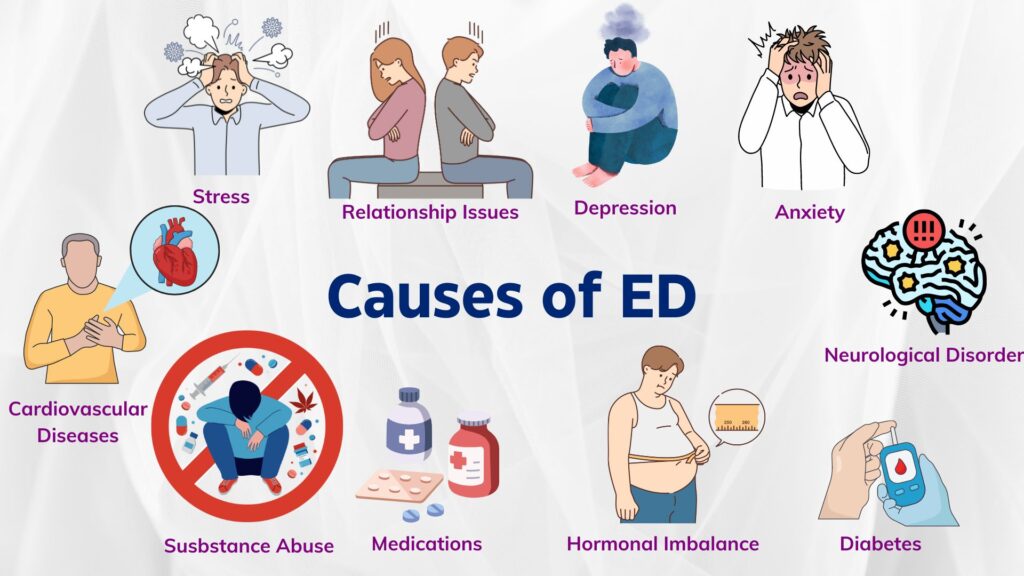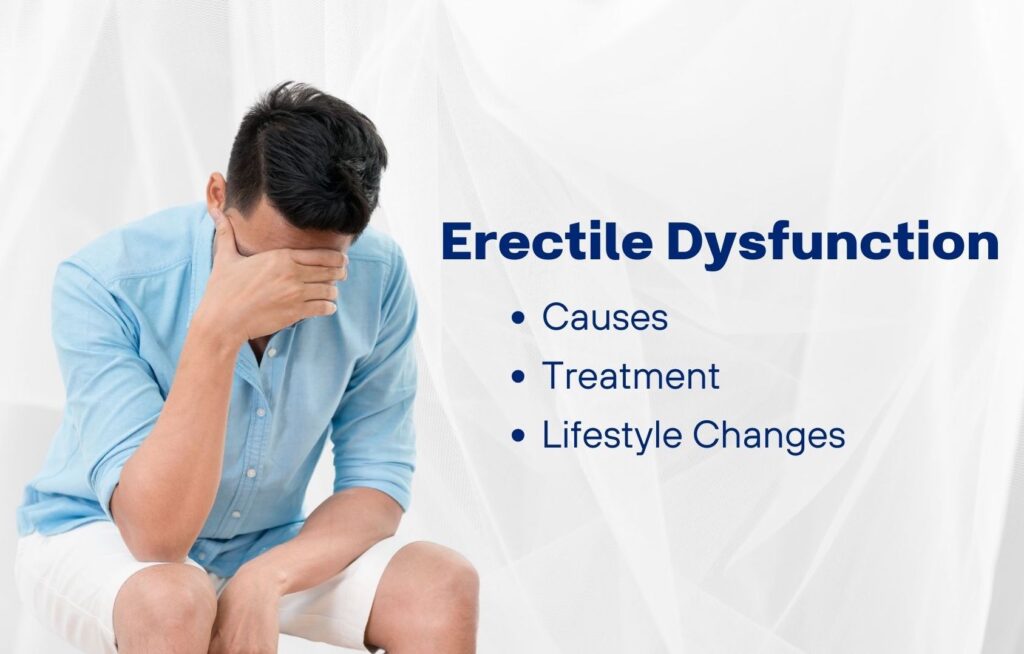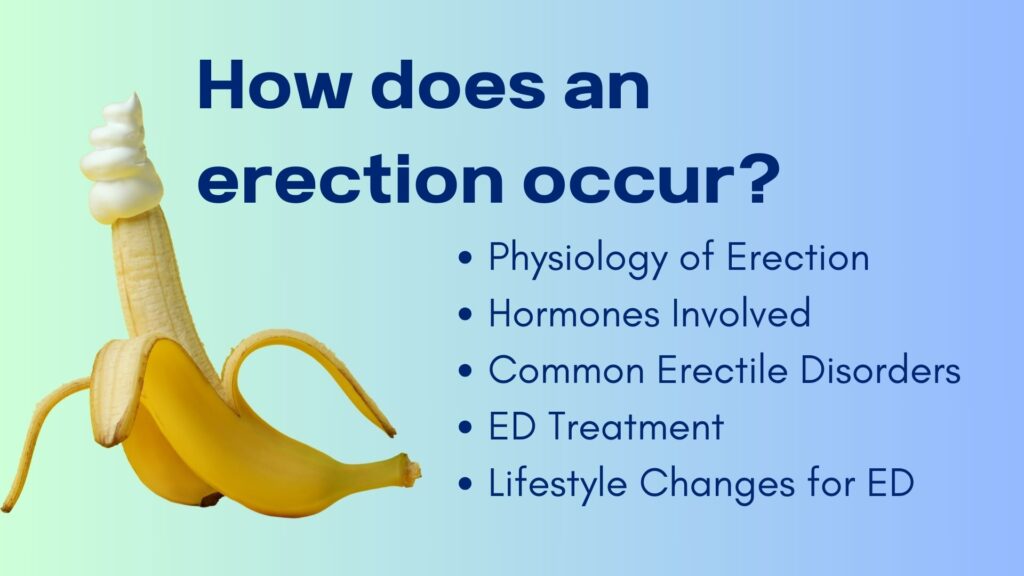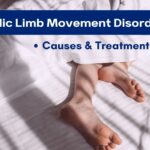Erectile Dysfunction (ED) is a prevalent medical condition affecting millions of men worldwide. It is characterized by the inability to achieve or maintain an erection sufficient for satisfactory sexual performance. While occasional difficulties with erections are common and often nothing to worry about, persistent issues indicate underlying health concerns that require attention.
In this blog, we will delve into the mechanics of erectile function, the various factors contributing to ED, its symptoms, diagnostic methods, available treatment options, and strategies for prevention and management. Erectile dysfunction is not merely a standalone issue; rather, it frequently serves as a precursor to more complex medical conditions. Studies indicate that up to 70% of men with erectile dysfunction also have underlying cardiovascular diseases or diabetes. Understanding ED is crucial for both affected individuals and also for their partners, as it can significantly impact overall quality of life and intimate relationships.
An erection is a complex interplay of neurological, vascular, hormonal, and psychological factors. When a man becomes sexually aroused, signals from the brain trigger the release of chemicals that cause the muscles in the penis to relax. This relaxation allows blood to flow into the erectile tissue, resulting in the penis becoming erect and rigid. In individuals with Erectile Dysfunction, this process is disrupted. The causes of this disruption can be multifaceted, ranging from physical conditions such as cardiovascular diseases, diabetes, and hormonal imbalances to psychological factors like stress, anxiety, or depression.
What causes Erectile Dysfunction?
Erectile Dysfunction (ED) can stem from various underlying factors, both physical and psychological.
Also Read: Premature Ejaculation – Causes, Treatment & Exercises
Physical Factors
- Cardiovascular Diseases: Conditions such as atherosclerosis (narrowing of arteries), hypertension (high blood pressure), and coronary artery disease can impede blood flow to the penis, leading to Erectile Dysfunction. Various researches have established a very strong correlation between ED and heart diseases.
- Diabetes: High blood sugar levels associated with diabetes often damage blood vessels and nerves, contributing to erectile dysfunction.
- Hormonal Imbalances: Imbalances in hormones like testosterone, thyroid hormones, or cortisol also can prevent proper erection thereby affecting sexual function.
- Neurological Disorders: Certain conditions such as Multiple sclerosis, Parkinson’s disease, or spinal cord injuries can disrupt nerve signals necessary for achieving an erection.
- Medications: A few medications such as antidepressants, antihypertensives, and chemotherapy drugs, may have side effects that can lead to to erectile dysfunction.
- Substance Abuse: Excessive alcohol consumption, smoking or tobacco use, and illicit drug abuse can all negatively impact erectile function.
Psychological Factors
- Stress: High levels of stress, whether related to work, relationships, or other factors, can interfere with sexual arousal and performance.
- Anxiety: Performance anxiety or general anxiety disorders is also equally common and can lead to feelings of inadequacy or fear of failure during sexual activity.
- Depression: Depression is yet another reason that can affect libido, energy levels, and self-esteem. All of these may contribute to erectile dysfunction.
- Relationship Issues: Conflict, communication problems, or lack of intimacy within a relationship also can manifest as ED.

Lifestyle plays a very important role in one’s ability to attain proper erection and maintain it. Lack of regular physical activity can contribute to obesity, cardiovascular problems, and hormonal imbalances, all of which are risk factors for ED. Poor dietary choices high in processed foods, saturated fats, and refined sugars are yet another reason that also cause a host of other lifestyle diseases such as diabetes, and cardiovascular diseases – all of which increase the risk of erectile dysfunction. Chronic alcohol abuse is yet another common reason for ED, as it can impair nerve function and reduce the male sex hormone (testosterone) levels, leading to erectile dysfunction. Smoking is yet another common lifestyle factor that damages blood vessels and reduces blood flow to the penis, increasing the risk of vascular-related ED.
Diagnosis & Treatment of ED
Diagnosing Erectile Dysfunction
Diagnosing Erectile Dysfunction (ED) at SOLVEMyHealth, involves a comprehensive evaluation which typically begins with a detailed medical history, where the individual discusses any existing health conditions, medications, surgeries, and lifestyle factors. Blood tests may be suggested by our expert panel to measure hormone levels and check for underlying medical conditions like diabetes or high cholesterol. A series of tests such as lipid profile, HBA1C, testosterone levels, prolactin etc may be suggested by our doctor panel. Additionally, assessing overall health, especially heart health is paramount as ED is often highly correlated with many other lifestyle diseases.
A psychological evaluation may also be recommended to assess for any psychological factors contributing to ED, such as stress, anxiety, or depression. In certain advanced cases, imaging tests such as ultrasound may also be required to evaluate blood flow to the penis. By conducting a thorough assessment, we can identify the underlying causes of ED and develop an individualized treatment plan tailored to the individual’s needs.
Also Read: How does erection occur?
Medical Treatment for Erectile Dysfunction (ED)
Treatment for Erectile Dysfunction (ED) aims to address underlying causes to improve erectile function and enhance overall sexual health. Depending on the underlying factors contributing to ED and individual preferences, the treatment modalities may vary. For men with low testosterone levels contributing to ED, testosterone replacement therapy may be recommended to restore hormone levels and improve erectile function. Phosphodiesterase type 5 (PDE5) inhibitors class of drugs such as sildenafil (Viagra), tadalafil, and vardenafil may be recommended by our doctors to help increase blood flow to the penis, facilitating erections when sexually aroused.
Certain non-invasive devices such as ‘Vacuum Erection Devices‘ (VEDs) that use a vacuum to draw blood into the penis, resulting in an erection is yet another management method for ED. These devices can be used as a standalone treatment or in combination with other therapies to achieve and maintain erections.
For individuals with severe or refractory ED who do not respond to other treatments, surgical placement of a penile implant may be considered. Penile implants are prosthetic devices inserted into the penis to facilitate erections when desired. In some cases, surgical procedures may be required to correct underlying anatomical issues contributing to ED, such as penile artery revascularization or venous ligation surgery.
Lifestyle Management for Erectile Dysfunction (ED)
Making lifestyle modifications can significantly improve erectile function and overall health. This may include regular exercise, a healthy diet, quitting smoking, proper sleep and limiting alcohol. Exercises, brisk walking, jogging, cycling, or weight training can improve blood flow and cardiovascular health, which can benefit erectile function. Adopting a diet rich in fruits, vegetables, whole grains, and lean proteins, limiting intake of processed foods, saturated fats, and sugars also can improve erectile function, apart from improving over all health and well-being.
Quitting smoking is very important to manage ED as it can improve blood flow and reduce the risk of vascular-related ED. Moderating alcohol intake is yet another lifestyle change that can prevent ED, especially alcohol-induced erectile dysfunction. Psychological counselling or therapy may be beneficial for individuals with ED caused or exacerbated by psychological factors such as stress, anxiety, or relationship issues. Counselling can help address underlying emotional issues, improve communication skills, and reduce performance anxiety.
Erectile Dysfunction & Cardiovascular Disease (CVD) – A Strong Connection
The association between Erectile Dysfunction (ED) and Cardiovascular Disease (CVD) is very strong and multifaceted, rooted in shared pathophysiological mechanisms and common risk factors. Both conditions are characterized by Endothelial Dysfunction. The endothelium is a thin layer of cells that lines the interior surface of blood vessels. They play a crucial role in regulating vascular tone, blood flow, and immune response, as well as maintaining vascular integrity and preventing clot formation. The endothelium can get damaged due to chronic inflammation that stems out of poor lifestyle, diabetes, smoking etc. Such an endothelial dysfunction reduces the nitric oxide (NO) bioavailability and endothelial nitric oxide synthase (eNOS) activity. This leads to impaired vasodilation, inflammation, and oxidative stress.
Endothelial dysfunction, driven by risk factors such as hypertension, dyslipidemia, diabetes mellitus, obesity, smoking, and a sedentary lifestyle, also leads to the development of atherosclerosis and other microvascular diseases. This leads to compromised arterial blood flow and tissue perfusion in both penile arteries (penis) and the coronary vessels (heart).
Moreover, ED often precedes symptomatic CVD, serving as an early clinical marker of subclinical vascular disease. Individuals with ED have an increased risk of cardiovascular events, including myocardial infarction (heart attack), stroke, and cardiovascular mortality. Therefore, comprehensive cardiovascular risk assessment is important for those who present with symptoms of ED.
Also Read: Delayed Ejaculation – Causes & Treatment
Equally important is implementing preventive strategies such as lifestyle modifications to reduce the risk of cardiovascular diseases alongside pharmacotherapy. This may concurrently improve erectile function and also reduce the risk of cardiovascular events. The interconnected nature of ED and CVD makes it imperative that the approach to managing and treating the ED needs to follow a holistic and integrated approach.
How can we help you in managing ED?
At SOLVEMyHealth, managing Erectile Dysfunction (ED) involves a comprehensive and integrated approach aimed at addressing underlying causes and improving overall health and well-being. Upon online consultation with our andrologist or urologist, individuals undergo a thorough evaluation to identify contributing factors to their ED. Medical management options, including prescription medications may be considered based on individual needs and medical history. In addition to medication, SOLVEMyHealth emphasizes lifestyle modifications, such as adopting a balanced diet and exercise plan tailored to cardiovascular health and weight management.
Furthermore, SOLVEMyHealth provides support for diet, exercise and other lifestyle modifications, offering guidance, resources, and ongoing monitoring to help individuals implement and maintain these changes effectively. By integrating medical management with personalized diet, exercise, and lifestyle support, SOLVEMyHealth aims to optimize erectile function and improve overall sexual health and quality of life for individuals with ED.












1 comment
Very nice article. Very scientific and helpful